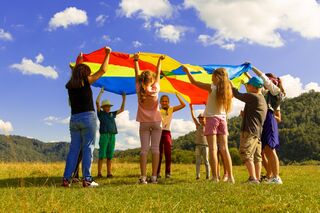Resilience
Rescued or Ready?
Summer camps: Building resilience in America’s youth.
Posted January 19, 2021

Raising resilient kids is all the rage, which is good given its close correlation to overall mental health.
In their book Growing Up Resilient, authors Tatyana Barankin and Nazilla Khanlou counsel, “People who are resilient can effectively cope with, or adapt to, stress and challenging life situations. They learn from the experience of being able to effectively manage in one situation, making them better able to cope with stresses and challenges in future situations” (Barankin and Khanlou, 2007).
For her part, Bonnie Benard, M.S.W., says, “We are all born with innate resiliency, with the capacity to develop the traits commonly found in resilient survivors: social competence (responsiveness, cultural flexibility, empathy, caring, communication skills, and a sense of humor); problem-solving (planning, help-seeking, critical and creative thinking); autonomy (sense of identity, self-efficacy, self-awareness, task-mastery, and adaptive distancing from negative messages and conditions); and a sense of purpose and belief in a bright future (goal direction, educational aspirations, optimism, faith, and spiritual connectedness)” (Benard, 2021).
More good news can be found in the recent Wall Street Journal article, “Despite Covid-19 Outbreak Risks, Summer Camps Are Filling Up Quickly,” which attests to the successful efforts of summer camps that opened safely in 2020 or are mapping a blueprint for 2021.
So, what’s the link between camp and resilience? In his Camping Magazine article, “Camps Help Make Children Resilient,” Michael Ungar, Ph.D., states, “When it comes to resilience, nurture trumps nature. Camps, like good schools and loving families, immunize children against adversity by giving them manageable amounts of stress and the supports they need to learn how to cope effectively and in ways that are adaptive ...” (Ungar, 2012).
Ungar goes on to enumerate seven experiences children need.
- New relationships, not just with peers, but with trusted adults other than children’s parents.
- A powerful identity that makes children feel confident in front of others, provides children with something genuine to like about themselves
- Camps help children feel in control of their lives.
- Camps make sure that all children are treated fairly.
- At camp, children get what they need to develop physically.
- Perhaps best of all, camps offer children a chance to feel like they belong.
- Camps can offer children a better sense of their culture.
The value of learning – and practicing – resilience at summer camp was encapsulated in a speech then-16-year-old Cameron Gray gave to younger campers in his role as a teen leader at Connecticut's Camp Hazen. He shared it with me on Zoom.
I want all of you to think of something you are good at, maybe a sport or a skill you learned at camp. Now, I want you to imagine how skilled you would be at that same activity if you have never failed while trying it. Probably pretty bad, right?
What is failure? Well, people define it as being unsuccessful or not being good enough. However, I see failure as being successful. One of my favorite sayings is “failing forward.” This means that in order to progress, you need to have setbacks.
I want to make it clear to all of you now that failure is OK and is needed to progress in life. When we were all younger, most if not all of our parents warned us to never touch the stove when it is on. What did you do next? You probably touched it but, guess what, now you know to never touch a hot stove again.
Let me take you way back to freshman year. I was sitting in world history class waiting to get my test back. Thinking I did amazing, I asked my teacher what the worst score was. He said 57%. I ironically said to myself, “What idiot got 57%?” I got 57%. I was that idiot. In reality, this setback made me a much better student. This is just one example of how one minor setback has pushed me to success.
Now for you, it might be getting out in Gaga or slipping off the Alpine Tower just as you’re about to get to the top. No matter the type of failure, no matter the circumstance, learn from what went wrong, and eventually, you will realize your goals.
My point with all these examples is to make sure that all of you know that failing forward is necessary for personal growth.
I’m going to tell you another story. About two months ago, I was playing third base in a baseball game. The batter hit a hard ground ball to me, it took a bad hop then, BOOM. I’m looking at the sky with blood all over my face and hands. This experience was not particularly a failure but more of a learning experience that taught me to always keep my right hand up while taking ground balls.
However, a learning experience doesn’t always have to be getting hit in the face with a baseball. It can be as small as saying the wrong thing at the wrong time and having what you said ruin the relationship you had with that person.
Newsflash, failing forward is the way to go. No matter what happens or what grade you get or any setbacks you have, always know that leaders become great leaders from failure and mistakes.
Now for you, I have a challenge, I want each and every one of you to learn from a mistake this next week and remember to fail forward.
Of course, children also learn to be resilient at home. Lizzy Francis, in her article “Resilient Kids Come From Parents Who Do These 8 Things,” says, “When you’re a kid, everything is a tragedy. Your grilled cheese has the crust on? The horror. Can’t assemble that Lego set? Might as well stomp up and down. You can’t change this. What you can do, however, is arm your kid with the techniques that teach them how to bounce back from their daily struggles so that, later on in life, when the stakes are higher, they know what to do” (Francis, 2018). According to Francis, parents of resilient kids do the eight things that follow. They:
- Let kids struggle
- Let their kids experience rejection
- Don’t condone a victim mentality
- Do more than tell them to “buck up” when struggles occur
- Help their kids learn how to label their feelings and emotions
- Give their kids the tools to self-soothe
- Admit their mistakes. And then they fix them
- Always connect their kid’s self-worth to their level of effort
Perhaps not surprisingly, in this age of pandemic, resiliency has taken a blow. New data from the Center for Adolescent Research and Education (CARE) and Total Brain reveals that high school and college students score well below the 50th percentile on self-control and, more specifically, resilience.
That makes the roles of summer camps and parents all the more critical … and urgent.
Collectively, we need not rescue our children but rather help make them ready for the world ahead, with all its challenges and uncertainties.
References
Barankin, T. and N. Khanlou. (2007). Growing Up Resilient: Ways to Build Resilience in Children and Youth. Toronto, Ontario, Canada: Centre for Addiction and Mental Health.
Benard, B. (2021). The foundations of the resiliency framework. Resiliency in Action. https://www.resiliency.com/free-articles-resources/the-foundations-of-t… (18 Jan. 2021).
Benard, B. (1991). Fostering Resiliency in Kids: Protective Factors in the Family, School, and Community. Portland, OR: Western Center for Drug-Free Schools and Communities.
Francis, L. (2018). Resilient kids come from parents who do these 8 things. Fatherly. November 26, 2018. https://www.fatherly.com/love-money/build-resilient-kids-prepared-for-l… (18 Jan. 2021).
Keates, N. (2021). Despite Covid-19 outbreak risks, summer camps are filling up quickly. The Wall Street Journal. January 12, 2021. https://www.wsj.com/articles/despite-covid-19-outbreak-risks-summer-cam… (18 Jan. 2021).
Mayo Clinic Staff. (2020). Resilience: build skills to endure hardship. October 27, 2020. https://www.mayoclinic.org/tests-procedures/resilience-training/in-dept… (18 Jan. 2021).
Ungar, M. (2012). Camps help make children resilient. Camping Magazine. September/October 2012. https://www.acacamps.org/resource-library/camping-magazine/camps-help-m… (18 Jan. 2021).


